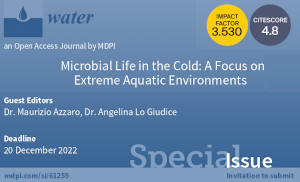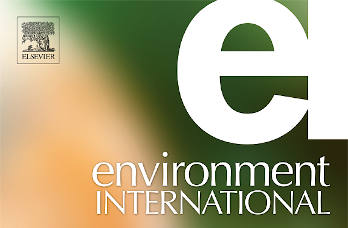Contenuti_italiano
 A special issue of Atmosphere (ISSN 2073-4433). This special issue belongs to the section "Air Quality".
A special issue of Atmosphere (ISSN 2073-4433). This special issue belongs to the section "Air Quality".
Deadline for manuscript submissions: 25 February 2021.
 A special issue of Journal of Marine Science and Engineering (ISSN 2077-1312). This special issue belongs to the section Marine Ecology.
A special issue of Journal of Marine Science and Engineering (ISSN 2077-1312). This special issue belongs to the section Marine Ecology.
This Special Issue is devoted to experimental studies and reviews, relating to any aspect of Biogeochemical Cycles and Ecosystem Functioning in Extreme Environments (e.g., polar regions, deep sea, Hydrothermal vents, Deep Hypersaline Anoxic Basins, etc) and aims to contribute to highlighting recent findings and acquiring a comprehensive perspective on the current status of this broad research field. All article types are welcome.
Deadline for manuscript submissions: 31 July 2023
Special Issue Editor: Maurizio Azzaro (CNR-ISP)
 A special issue of Water (ISSN 2073-4441). This special issue belongs to the section Aquatic Systems - Quality and Contamination.
A special issue of Water (ISSN 2073-4441). This special issue belongs to the section Aquatic Systems - Quality and Contamination.
This Special Issue aims to present new research to advance our knowledge on all the aspects related to the proposed subject. Specifically, the topics of interest include but are not restricted to: Emerging and legacy pollutant analyses: occurrence and distribution of selected contaminants in water column and sediment; the role of the microbial community in transferring pollutants to higher trophic levels: to elucidate drivers and followers in this process and identify key-species for contaminant turn-over and accumulation; dynamics of natural microbial communities: to distinguish microbial community structure and function spatial and temporal changes; dynamics of contamination in polar and temperate aquatic ecosystems.
Deadline for manuscript submissions: 31 July 2021
Special Issue Editors: Nicoletta Ademollo (CNR-ISP), Francesca Spataro (CNR-ISP), Jasmin Rauseo (CNR-ISP) and Luisa Patrolecco (CNR-ISP).

A special issue of Journal of Marine Science and Engineering (ISSN 2077-1312). This special issue belongs to the section "Marine Biology".
Deadline for manuscript submissions: 30 June 2020
Special Issue Editor: Gabriella Caruso (CNR-ISP)

A special issue of Geosciences (ISSN 2076-3263). This special issue belongs to the section "Geochemistry".
The main scope of this Special Issue is the exploration and evaluation of both innovative and long-validated approaches to the geochemical characterization of geothermal areas.
Deadline for manuscript submissions: 25 July 2022
Special Issue Editors: Giovanni Vespasiano (UNI-Cal), Massimiliano Vardè (CNR-ISP), Carmine Apollaro (UNI-Cal)

A special issue of Atmosphere (ISSN 2073-4433). This special issue belongs to the section "Climatology".
This Special Issue invites contributions addressing all aspects of cold regions meteorology and the cryosphere interacting with the past, present and future climate system from both modeling and observations. Submissions from multiple approaches, i.e., past records, glaciers, ice caps, sea ice, permafrost, meteorological and geophysical observations, numerical modeling and downscaling methods aiming to advance the current knowledge of the feedbacks between the cryosphere and the climate system are encouraged. Interdisciplinary studies, as well as detailed process surveys, are highly welcome.
Deadline for manuscript submissions: 5 February 2021.
Special Issue Editors: Renato R. Colucci (CNR-ISP)
 A special issue of Animals (ISSN 2076-2615). This special issue belongs to the section "Ecology and Conservation"
A special issue of Animals (ISSN 2076-2615). This special issue belongs to the section "Ecology and Conservation"
This Special Issue aims to provide a comprehensive overview of the different life-history strategies adopted by the notothenioid fishes to cope with the environmental conditions encountered across a wide latitudinal range, spanning from cold waters around the Antarctic continent to cold-temperate waters of sub-Antarctic Islands and the Magellan Region. The main topics to be covered include age and growth estimates, early life history and life span, reproductive traits, and feeding behavior.
Deadline for manuscript submissions: 31 December 2021
Special Issue Editors: Mario La Mesa (CNR-ISP), Facundo Manuel Llompart (CADIC-CONICET)
 A special issue of Microorganisms (ISSN 2076-2607). This special issue belongs to the section "Environmental Microbiology".
A special issue of Microorganisms (ISSN 2076-2607). This special issue belongs to the section "Environmental Microbiology".
This Special Issue aims to compile scientific contributions on low temperature microbiology with a focus on current and future global challenges. Original research, review, and perspective papers addressing the following topic areas will be considered: Environmental change: e.g., the taxonomic and functional diversity of microbial communities in polar and alpine regions, biodiversity loss, biotic and abiotic interactions, biological processes and biogeochemical cycles, greenhouse gas production, ice-albedo, etc.; Long-term microbial preservation in nature: e.g., microbial ancient DNA (aDNA), viability and metabolic activity of microorganisms in ancient cryo-environments, old pathogens in melting glaciers and permafrost, etc.; Sustainable bioproducts and bioprocesses: e.g., omics-based approaches to the discovery of functional molecules, expression systems and fermentation strategies, cryo-enzymes, antimicrobials, biosurfactants and other cold-active biomolecules of biotechnological potential, etc.
Special Issue information - Deadline for manuscript submissions: 15 December 2022.
Special Issue Editors: Amedea Perfumo (AWI), Angelina Lo Giudice (CNR-ISP)

The Special Issue, Microbes in Extreme Marine Environments, is devoted to fundamental and applied aspects concerning the study of the microbial diversity of marine extreme environments and aims to contribute to highlighting recent findings and acquiring a comprehensive perspective on the current status of this broad research field. Since some extreme marine environments are somehow underrated from a microbiological point of view, this Special Issue will also contribute to filling gaps in this growing research topic. FLYER
Submission Deadlines: 15 March 2023
Special Issue Editors: Susanna Gorrasi (Uni-Tuscia), Gabriella Caruso (CNR-ISP), Violetta La Cono (CNR-ISP), Concetta Gugliandolo (Uni-Messina), Maurizio Azzaro (CNR-ISP)
 A special issue of Water (ISSN 2073-4441). This special issue belongs to the section Biodiversity and Ecosystem Functioning. Deadline for manuscript submissions: 20 December 2022.
A special issue of Water (ISSN 2073-4441). This special issue belongs to the section Biodiversity and Ecosystem Functioning. Deadline for manuscript submissions: 20 December 2022.
Special Issue Editors: Dr. Maurizio Azzaro, Dr. Angelina Lo Giudice - Institute of Polar Sciences, National Research Council, Italy (CNR-ISP)
More...

The Special Issue, New Advances in Ecosystem Services, Biodiversity, and Environmental Sustainability, will investigate the latest advances in the sustainable exploitation of different ecosystems and exploration of their potential. We are inviting scientific contributions assessing new biomolecules and the potential of bioremediation using organisms and microorganisms, as well as those evaluating their environmental impact, environmental response, and the assessment of their extent and limits.
Submission Deadlines 30 June 2023.
Special Issue Editors: Maria Papale, Angelina Lo Giudice (CNR-ISP)
 A special issue of Remote Sensing (ISSN 2072-4292). This special issue belongs to the section Biogeosciences Remote Sensing.
A special issue of Remote Sensing (ISSN 2072-4292). This special issue belongs to the section Biogeosciences Remote Sensing.
The scope of this Special Issue is to collect research articles focused on, but not limited to, applications of remote-sensing data/techniques combined with other approaches to better monitor and/or understand processes occurring on snow-covered and glaciated areas, in different environmental frameworks. Manuscripts using novel approaches based on data integration and on multimission products are particularly welcome.
Deadline for manuscript submissions: 20 May 2023
Special Issue Editors: Roberto Salzano (CNR-IIA), Rosamaria Salvatori (CNR-ISP), Angelika Humbert (AWI).
A special issue of Water (ISSN 2073-4441). This special issue belongs to the section "Soil and Water".
The Special Issue aims to investigate and understand the sources, fate, transport, and effects of persistent and emerging organic contaminants on natural ecosystems. These contaminants are spread in all environmental compartments at middle and high latitudes due to their worldwide production and consumption related to anthropogenic activities. Most of these organic micropollutants cause adverse effects on organisms at different levels of the trophic web. In this scenario, the investigation of the potential effects and toxicity associated with their occurrence in abiotic and biotic natural compartments can not be negligible. This Special Issue will update the state-of-the-art and partially fill the knowledge gap regarding these contaminants.
Submission Deadlines 31 January 2023.
Special Issue Editors: Jasmin Rauseo (CNR-ISP), Francesca Spataro (CNR-ISP) and Luisa Patrolecco (CNR-ISP)
 Pubblicato sul sito web della rivista internazionale Environment International lo Special Issue Plastics in polar regions.
Pubblicato sul sito web della rivista internazionale Environment International lo Special Issue Plastics in polar regions.
Guest Editor: Ilaria Corsi, Elisa Bergami, Gabriella Caruso (CNR-ISP), Simone Cappello
 Ministero dell'Universita e Ricerca
Ministero dell'Universita e Ricerca
Programma Ricerche Artico
Programma Nazionale di Ricerca in Antartide
 Ministero degli Affari Esteri e della Cooperazione Internazionale
Ministero degli Affari Esteri e della Cooperazione Internazionale
L'Italia e l’Artico
L’Italia e l’Antartide
CNR-ISP
Consiglio Nazionale delle Ricerche
Istituto di Scienze Polari
c/o Campus Scientifico - Università Ca' Foscari Venezia - Via Torino, 155 - 30172 VENEZIA MESTRE (VE)
Salvo diversa indicazione, il contenuto di questo sito è concesso in licenza : Attribuzione - Non commerciale - Condividi allo stesso modo 4.0 Internazionale (CC BY-NC-SA 4.0) 
Privacy policy e Cookie policy - Amministrazione trasparente CNR








